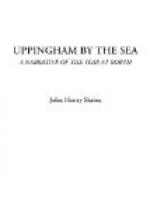More pensive spirits saunter up and down the grassy terrace which overlooks the beach, and watch the shifting line of dark figures seen against the white wall of the breaker, or note the fugitive tints on the dimpling surface of the water, or the wet margin of the tide. A group of villagers is clustered round the water-fountain a few yards away; the children chatter about us as they fill their pitchers; and the old women, creeping homewards, cast a glance under their bonnets at the boys, and exchange muttered comments with their gossips. Soon the cliffs of the southern headland grow duskier and more remote; the sea fades to a cold uniform gray; the colours of the brown twilight marsh and the violet hills are lost in one another; and so, with a refreshing breath of idyllic peacefulness, the stirring week came to an end. “Its evening closed on a quiet scene of school routine, as if doubt and risk, turmoil and confusion and fear, weary head and weary hand, had not been known in the place. The wrestling-match against time was over, and happy dreams came down on Uppingham by the Sea.”
CHAPTER V.—THE NEW COUNTRY.
All places that the eye of Heaven
visits,
Are to a wise man ports and happy
havens.
RICHARD II.
The primitive man, after he has satisfied the claims of appetite, stitched his skin-mantle, and thatched a hut, may begin to spare time for reflection on the quality and flavour of the prey he has eaten, or the picturesqueness of his cabin. Till then his estimate of things is quantitative. He asks not of what sort his food is, but whether there is enough of it, and regards less the cut of his coat than its thickness.
The analogy of our circumstances must be our excuse for postponing so long a description of our new settlement, its physical surroundings, and the complexion of our domestic and social life. Not in truth that we had returned to barbarism: but who could dilate on the beauty of mountain scenery, in sight of which he was perhaps to starve; who would criticise the pattern of his dinner-service, or be fastidious in carpets and wall-paper, before he could reckon upon dinner, or call shelter his own?
But a week is over, and we have all settled into our berths. The boys have found that there will be dinner every day; the masters that no one will have to pitch his tent on a sand-dune, or spread a straw litter in a bathing-machine. The level of comfort was, of course, not uniform. How should it be? Probably there is a choice of corners in a workhouse or casual-ward. Some of our party tasted the painful pleasures of the poor in the scant accommodation and naked simplicity of cottage lodgings. It was long after our arrival that we discovered a valued friend still sitting on the corner of his packing-case, and brewing his coffee on a washhand-stand. The fire smoked all day; but this vice in the apartment was neutralised by a broken window. Yet he should be quite happy, he said, if he could get a glazier and a sweep (like smoke and draught, one would not do without the other), a bolster, an occasional clean towel, and a little warm water in the morning.




